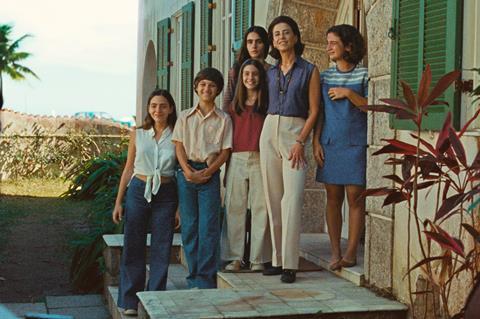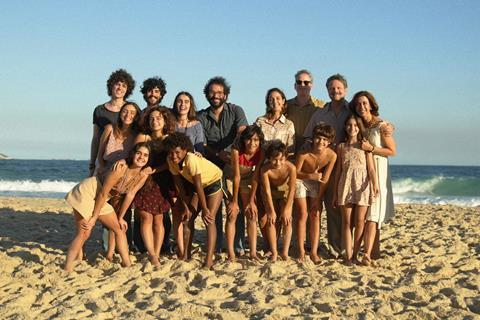The director and star of I’m Still Here discuss returning to 1970s Brazil, then under military dictatorship, for their real-life drama.

Brazilian director Walter Salles and actress Fernanda Torres, the star of his film I’m Still Here, have moved in the same circles for much of their lives. Salles’s brother was at the same school as the actress’s brother and, as Torres says, “In Rio de Janeiro, we all know each other.”
The first time the pair encountered each other in anything approaching a professional capacity was when Salles interviewed an 18-year-old Torres for a documentary he was making. They then worked together on Foreign Land (1995), co-directed with Daniela Thomas, and The First Day (1998), while Torres’s mother Fernanda Montenegro starred in Salles’s Central Station, which won a Bafta and was nominated for two Oscars in 1999.
Now, Torres and Montenegro (the later of whom appears in cameo) collaborate again with Salles on I’m Still Here, which premiered at Venice and marks the director’s first fiction feature since 2012’s On The Road. Based on a true story and adapted from the book Ainda Estou Aqui by Marcelo Rubens Paiva, I’m Still Here follows the close-knit, middle-class Paiva family — who were friends of a young Salles — and is set in the early 1970s, during the era of military dictatorship (1964-85). When easygoing former congressman Rubens Paiva (Selton Mello) is suddenly arrested and vanishes, his wife, the dogged and resilient Eunice (Torres), tries to hold the family together in his absence.
Winner of the best screenplay prize at Venice for writers Murilo Hauser and Heitor Lorega, I’m Still Here will begin its rollout on December 20 in the US via Sony Pictures Classics, then expanding in January.

Screen International: When did you first work together?
Walter Salles: The first collaboration was Foreign Land. That was quite unique, a very collective film. In the mid-1990s, the crisis left by the military dictatorship was such that 800,000 people fled the country and went into exile. That film offered a reflection of what we were experiencing. It’s a story of young Brazilians who try to find a shelter in Portugal, a reverse angle of colonialism.
Fernanda Torres: The dictatorship ended and the economic crisis started right after it.
Salles: With Alice In The Cities [1974], Wim Wenders wrote every single night what was going to be shot the following day. Our film had the same kind of immediacy. It was a wonderful way to blend documentary and fiction. It was about identity and the loss of identity.
Torres: That was our formative movie. We all came from different backgrounds. Daniela [Thomas] was coming from theatre, and I was in the same theatre company. We were creating the dialogue by improvising. I think Walter discovered the director he was in this movie. He didn’t want big productions, he wanted to do something close to his documentary background.
What did you make of Walter Salles as a director?
Torres: He is very sensitive, open. I say that when I work with Walter, I just don’t want to disappoint him. Walter likes to whisper in your ear when he wants to do something different in the scenes — and he likes to do it without telling the others what he is whispering.
What were the experiences of your families during the dictatorship in Brazil?
Salles: When I first met the Paiva family, I was coming back [to Brazil] after five years living abroad. My father, a diplomat at that point, was working in France. What truly affected me coming back was that I didn’t recognise my own country. Rio de Janeiro is a city with areas where you mingle collectively. Going back to those places then, there was always a police car, a military truck. There was something in the temperature of the city that had changed.
I was pretty much lost until I met the five kids of the Paivas — I was invited into their home, which is very similar to the one you see in the film. They used to rent a house just in front of the beach. There was a constant flow of people. Political discussions emerged from that flow. Music could be heard. The desire for another country pulsated in that house, and we all felt that. This is why, every weekend, we drifted to that house.
One day, the house was suddenly altered by an act of violence committed by the state. That was something no-one who had been part of that house forgot.
Torres: And this death [of Rubens Paiva] defined a big difference in the country, that nobody would be safe. He was a congressman. When he died, it was like it could happen to anybody. I remember it vividly because I was born in Rio and then my family, two actors and theatre producers, went to Sao Paulo.
My father [Fernando Torres] had a partner in the theatre, and his partner was arrested in the same way. He was financing the guerrillas — my father didn’t know that. They would have plays forbidden a day before their opening. Daniela, who is the associate producer of the movie, her father was taken in the same period as Rubens Paiva was taken, and for three months the family didn’t know where he was.
Salles: With the Rubens Paiva case, I think we all understood how arbitrary the oppressive violence of the state could be. It truly defined a moment where an escalation of violence became perceptible.
Torres: Even after this period, I fear the police. We inherited the military police from this period.
Salles: For most Brazilians, the period of that regime had reflections in every family’s life. When my generation started to do their first films, one of the first projects I had was with your mother, Fernanda Montenegro. It was the story of Zuzu Angel, a fashion designer who used to design clothes for bourgeois women in Brazil. Her son embraced the armed resistance. He was arrested and killed, and she became one of the strongest opponents of this regime.
Torres: You had this project a long time…
Salles: We didn’t have the rights. And the economic chaos immediately after that in Brazil is what led me straight after to co-direct Foreign Land with Daniela Thomas. That’s how I didn’t get to work with your mother and I worked with you.

Did the experience of shooting bring back any of these memories for you?
Salles: What I remember from [the Paivas’] house is that you were invited to be part of something that was truly intimate. There were no barriers between generations, adults and adolescents or children. We had the house [in which the film was shot] two months prior to the shoot. We literally lived in that house.
Torres: We were all friends, all those actors. Selton Mello [who plays Rubens] is a very old pal. We were all very touched by the fact you were coming back to do a film — and a film about Marcelo Paiva. When we are having a party [in the film], we are really having a party. We were shooting chronologically. When the police arrive and take Selton away, the house went dark — the whole process was very realistic. I think I have never been so honest as an actress in my life.
Salles: Every time we could improvise, we did improvise. There was a space for constant creation.
Torres: I remember the first day we shot after [Eunice] knows her husband is dead and she takes the children to get an ice cream. The idea that a woman has to take care of her children knowing her husband has been tortured and killed, these two conflicting movements, when we finished shooting I went outside and started to sob. Even now, I find it so touching, this restraint and endurance. You don’t find it that much in fiction, a character with so many levels of truthfulness.
Fernanda, what was it like having your own mother play your character as an older woman? Is it true that some people think the actress is you?
Torres: There was a critic in Italy, it started there, who said the make-up artist is amazing. We thought it was just this guy [who mistook my mother for me] but it’s not only there — it’s been happening all over, from people who don’t know she is my mother.

























No comments yet